There is a country in the Caucasus called Azerbaijan.
Now Caucusus is a region between Black Sea and Caspian Sea and as you could see in the map below Azerbaijan virtually is a bridge between Europe and Asia.
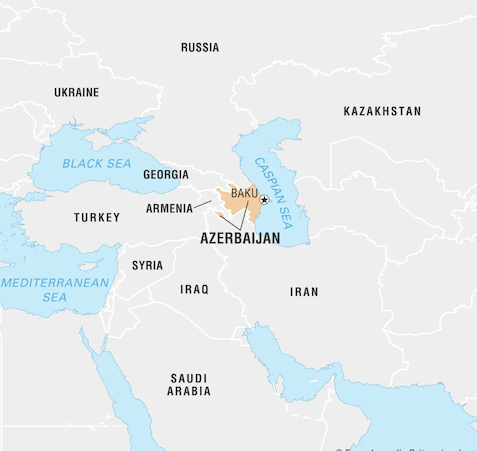
It thus is seen as a pivot to connectivity in the landmass we call Eurasia (why do they call Europe a continent anyway) and thus hugely important to China, India, Iran and Russia, arguably the fulcrum of forces ushering in a multipolar world.
China has been in this game for a decade through its Belt and Road Initiative (BRI); India-Iran-Russia are the originators of International North South Transport Corridor (INSTC) and Azerbaijan, unsurprisingly, is much valued in both projects.
The two networks, BRI and INSTC, once the latter is completely functional, would integrate the entire Eurasian landmass, a nightmarish prospect for the sea powers, led by the United States, which presently encircle them and hold levers on their multilateral trade, not to say the supply lanes of two energy guzzlers, China and India.
INSTC holds immense importance to India’s dream of becoming a developed nation. It opens up the entire landmass presently not feasible since Pakistan and China sit on its west and east and there are Himalayas on the north. India thus relies on the seas which washes its shores from three sides for its trade and needs; a very costly affair as could be understood.
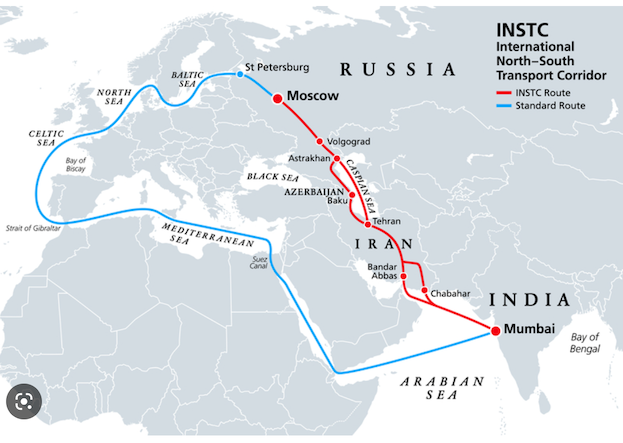
INSTC would be a massive boon for it would dramatically cut down the time and money India spends on its business. We have the word from the Federation of Freight Forwarders’ Association in India that INSTC would be 30% cheaper and 40% shorter on the existing routes.
Now comes Azerbaijan in the picture which, let’s say, is causing squirms.
Azerbaijan is in hotbed with Pakistan and Turkey in condemning India on Kashmir. It needs Turkey for its military needs which it used to good effect against Armenia in the 2020 war.
Turkey needs Azerbaijan for bringing together the Turkic lands in the historical bind of Ottoman Empire which runs on the thread of Islam.
Pakistan wants the Turkish umbrella as a counterweight to India which has grown increasingly important to its otherwise traditional allies in the Arab world: Saudi Arabia and UAE for instance.
There are other implications: Turkey, Azerbaijan and Pakistan have territorial claims on Cyprus, Armenia and Kashmir and potentially could unsettle a region from the European Union to the Himalayas.
The Iran Question
Now Azerbaijan and Iran are on rather hostile terms lately.
Azerbaijan has plans for Zangezur Corridor which would connect it to Turkey, passing through the Armenian territory (see image below) who understandably isn’t keen to cede the passage, what if the 2020 war had put it on a bind on the matter.
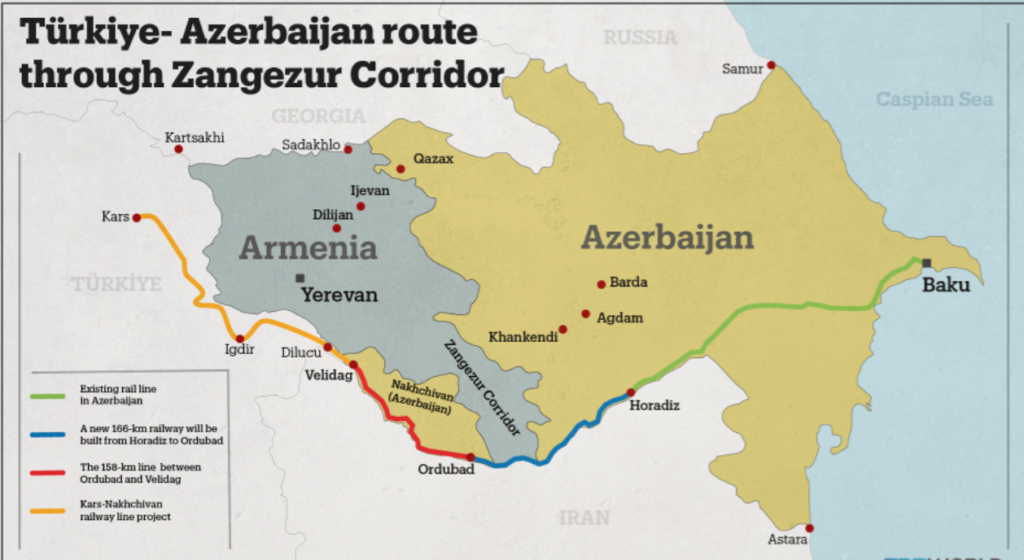
Both Turkey and Azerbaijan would be a big winner if it happens, opening up Central Asia and Caspian to one and the entire West Asia to the other, not to say the candy of vital gas pipelines.
But Iran stands to lose a great deal if it were to happen.
For it would cut down Iran’s access to Armenia, and thereby to Black Sea and Europe which lies beyond this rather poor Christian-majority country.
Once Turkey and Azerbaijan overcome the geographical divide with Zangezur Corridor, they could stir secession through Azeris who are one-fourth of Iran’s population, 25 million in a total population of nearly 100 million.
It could trigger a Balkanization of Iran due to multiple “ethno-nations” within its fold, like Kurds ( in Khurasan), Balochis etc.
It would limit Iran’s options to work around crippling US sanctions and diminish its influence in its backyard.
Sensing so, Armenia has proposed a parallel corridor to India and Iran in relation to INSTC to pass through its territory which Iran has all the reasons to consider favourably, and which has made India too weigh its options.
As of now though Armenia lacks the infrastructure–rail, road, ports etc– on which Azerbaijan enjoys huge advantage due to its years of diligence on the INSTC project.
Yet Iran has more than one reason to promote Armenia in this quest.
Music To US’ Ears
Now Iran’s discomfiture is music to the United States’ ears.
It could offset the major setback Washington has seen in recent Saudi Arabia-Iran handshake, brokered by China no less.
It could throw a wrench in the transport corridors of BRI and INSTC and punch holes into the integration plan of Eurasian landmass.
Project Azerbaijan is thus suddenly a priority for Washington. While only last year, Nancy Pelosi and all were standing for “Armenia’s democracy” and “human rights”, lately the US is on a course correction and making overtures to Azerbaijan fervently.
Funnily, it’s a kind of role reversal for both Washington and Moscow.
Now Russia is a military ally of Armenia through CSTO (Collective Security Treaty Organization), a Russian NATO, but the peace deal it brokered between Azerbaijan and Armenia after the 2020 War, left the latter rather dissatisfied. Likewise, the United States too appears is leaning more towards Azerbaijan than on Armenia.
It would tell you how important Azerbaijan is not just to India and China (for their transport corridors), Turkey and Iran, but also the two arch enemies, the United States and Russia, locked into an existential battle.
The United States could achieve multiple goals with Project Azerbaijan. One, it would destabilize Iran; two, it would be a setback to China and India in their quest for trade corridors; three, it would drag Russia into another trouble on its door like Ukraine; fourth, it could stir up secessionist dreams in Russia’s Caucusus within; fifth, it could help damage the ballooning trade ties between India and Russia.
It would be a massive revenge for Washington if it was to succeed in its mission.
The US is smarting from a massive gain by Russia which first seized Mariupol in Ukraine to make Azov Sea its own pond, which in turn through Crimea and the Kerch Strait allows it a transit from Black Sea to the Mediterranean Sea and beyond.
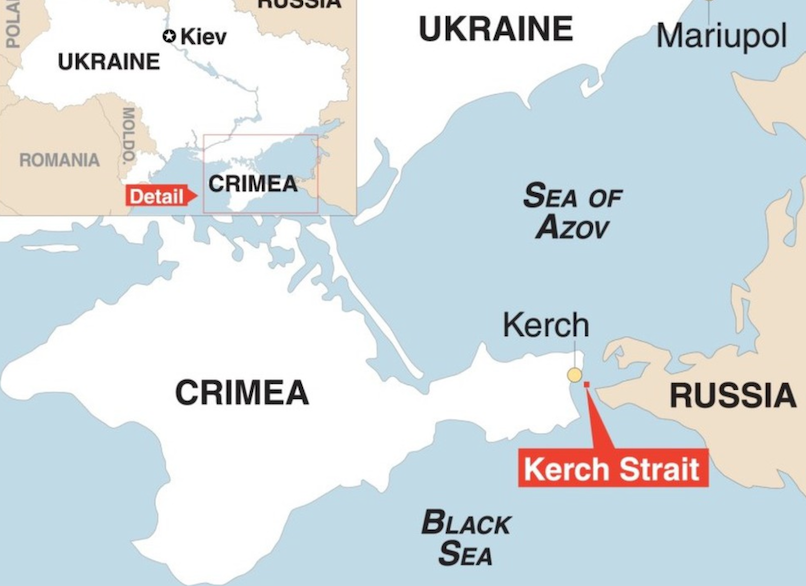
The Kerch Strait also links up Russia’s major waterways including the Volga and the Don; leading all the way up to the Baltic Sea and the Northern Sea (see image below) that connects Atlantic and the Pacific Ocean through its 4,800km long shipping lane, along the Russian coasts of Siberia and the Far East.
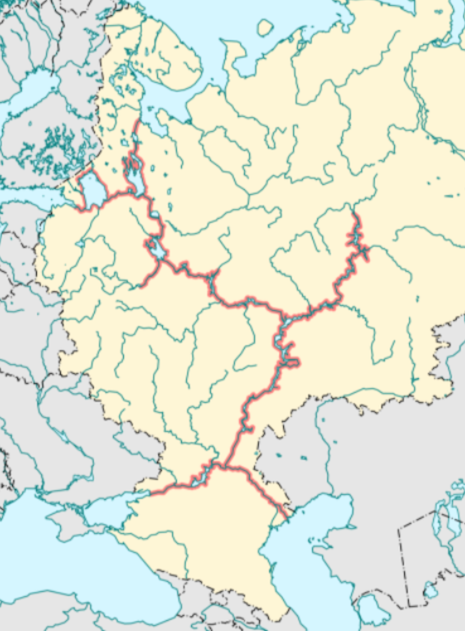
So things have been set in motion.
On December 7, 2022, the World Bank praised Azerbaijan for its initiatives on “Green Growth” which means massive funds would soon follow towards its development.
Five days later, the USAID (US Agency for International Development) held a conference co-sponsored by Azerbaijan and the White House!
In January this year, the Azerbaijan foreign minister called upon Josep Borrell of the European Union in Brussels.
Russia’s Concerns
All of this of course concerns Russia which strives for friendly ties with Azerbaijan while being militarily committed to Armenia.
A setback in Azerbaijan could help NATO in its goals towards Central Asia and Xinjiang.
Like Iran, Russia too has more more than half a million Azeris within its borders.
Mercenaries from across the border could easily infiltrate Dagestan and Chechnya; and via the Caspian could spread themselves into Kazakhstan, Uzbekistan, and Kyrgyzstan, stretching the CSTO to the limit in fighting the fire.
That’s a nightmarish prospect for Russia, China and India—a Jihadi land stretching from Caucasus to Central Asia to Xinjiang to Afghanistan.
Russia, of course, owns a few aces up its sleeves but it needs to play them carefully.
(a) The Zangezur Corridor, if it was to happen, would still be under Russia’s control due to the terms of the ceasefire deal between Armenia and Azerbaijan after the 2020 War;
(b) Russia has begun supplying gas to Azerbaijan which helps the latter not only in meeting its domestic needs but also in its export commitments to Georgia and Turkey, as well as its expanding supply with Europe;
That’s the Great Game being played which would not leave India unaffected: in trade or terrorism!


